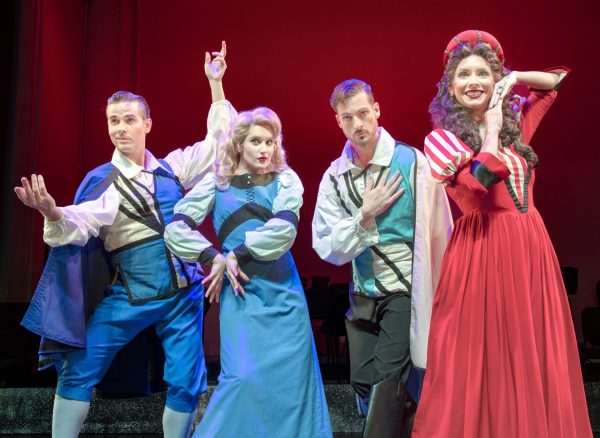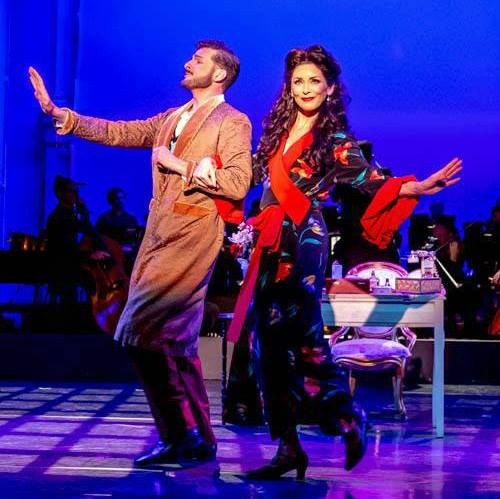
One Shrew Love |
St. Petersburg Opera’s Kiss Me Kate
SPO revives the beloved Cole Porter musical/Shakespeare retread in conjuction with the Bard-celebrating St. Petersburg’s Celebration of the Arts.
BY KEVEN RENKEN | Feb. 6, 2019
Thank goodness for that wink.
At the end of Cole Porter’s classic (though at this point somewhat precious) show-within-a-show musical Kiss Me, Kate, theatrical exes Fred and Lilli have reconciled at the same time that Katherine bends the knee in love and loyalty (though really it feels like subservience) to her husband Petruchio in The Taming of the Shrew.
To the everlasting credit of director Daryl Gray of the St. Petersburg Opera Company’s production (running Feb. 8 and 10 at the Palladium Theater), Fred as Petruchio bends the knee back. That’s the very least one should expect in this more enlightened age. But then Lilli/Katherine turns to the audience and breaks the fourth wall by winking. This simple action speaks volumes about an inequality that the rest of the show seems to embrace.
I’m sure by now most know the story. Divorced couple Fred Graham (Michael Kelly) and Lilli Vanessi (Michele Sexton), touring in a production of the aforementioned piece by the Bard, are dangerously close to reuniting (despite her engagement to another) before a faux pas on Fred’s part sets them once again at odds. The charm of the show has always been that the sparring off-stage both parallels and influences the plot machinations on-stage. Mix in two comically deadpan gangsters out to collect a debt from the wrong person and there’s every possibility that hilarity will ensue.

And of course there’s that music, some of the most consistently pleasing tunes musical theater has ever produced. “Another Openin’, Another Show,” “Too Darn Hot,” “Always True to You in My Fashion,” “Brush Up Your Shakespeare” and many, many others are given top-notch renditions here by a cast of beautiful singers.
On, and the acting is on par with the singing. Kelly is a surprisingly chilly Fred/Petruchio, over-enunciating everything to the point that it becomes some approximation of what the character should be like and not a real person. Sexton fares somewhat better as Lilli, though she never really lets loose as Katherine. Charles Logan is fairly one note as Bill, leering at all women, and especially Lois Lane, like they were pieces of meat (so much for equality). But so what, because Monica Charline Brown, as Lois, acts circles around almost everyone else in the cast. Not only was her “Always True to You in My Fashion” worth every one of the 432 encores she got when I saw it (okay, kidding, maybe only two or three), but her decision to not play Lois like a dingbat helped cancel out the fact that she still had to sing cringe-worthy lyrics like “so your baby can become your slave.”
Other highlights include Ward G. Smith and Shaun Rice as the Gangsters. They say so much by doing so little that often their simple appearance was cause for laughter. The dancing was exceptional, especially “Too Darn Hot” at the beginning of the second act (led by the spectacular Curtis Bannister). Some of the dialogue is still pretty clever (“I will go where no one will find me. I’ll go to Washington” is an example). And the orchestra. The orchestra. The orchestra. ‘Nuff said.
A set that prided itself on its simplicity could have gone even further in that direction – some of the changes were a little clunky. And there also a few directorial choices that were somewhat curious. But overall the production, though not exactly fresh, is also not exactly dusty or shopworn either. Though this is the kind of show that will never be mistaken for a feminist manifesto, at least it took steps to remove itself from the Dark Ages of even a few decades ago.
One little wink can go such a long way.


